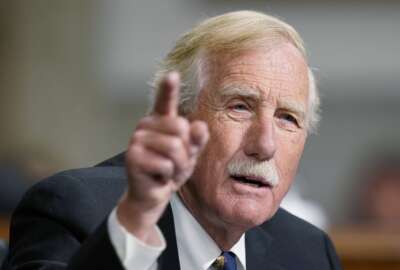Senate panel takes big step to help end hold on nearly 370 military nominations
In today's Federal Newscast: Postponing maintenance at federal buildings is costing the government $22 billion. The White House has temporarily filled a top cyber...
- Agencies are getting closer to putting in place a new software security requirement for contractors. The Cybersecurity and Infrastructure Security Agency’s is out with a new draft of the secure software development attestation form. And this one would require chief executive officers to chief operating officers to sign on dotted line. The form is part of the Biden administration’s push to ensure federal agencies use securely built software. Once the document is finalized, agencies will need to require their vendors to sign the form before using their software. The draft form is open for comment until Dec. 18.
(CISA aims to make executives sign off on security of software sold to government - Federal News Network)
- A recent inspector general's report flaged cybersecurity concerns for a new Postal Service health care marketplace and scrutinized steps the Office of Personnel Management is taking to create the Postal Service Health Benefits (PSHB) Program. It is a parallel system to the health care marketplace for all other federal employees. The IG report warned that some cybersecurity best practices were not implemented before OPM launched parts of the system. The IG said that raises the risk of a significant cyber incident, and additionally warning the sitution increases risks to OPM’s other IT systems.(OPM watchdog flags cybersecurity concerns for USPS health care marketplace - Federal News Network)
- A Senate panel has taken a big step to help end the hold on nearly 370 military nominations. The Senate Committee on Rules and Administration voted 9-7 to let Senators confirm large groups of nominees with a single vote. That basic idea is the Senate's custom — but until now, it has required unanimous consent, and a single senator can object and stop the process. The new resolution would change that, but the new approach would need a floor vote by at least 60 Senators. It is a response to Senator Tommy Tuberville’s decision to block military nominations because of his opposition to DoD's policy that offers paid leave and travel reimbursement to military personnel seeking abortions.(Senate panel looks to end military nomination hold - Senate Committee on Rules and Administration)
- The Office of Federal Procurement Policy (OFPP) is taking an important first step to standardize acquisition data, by outlining six focus areas in a new draft circular under the Better Contracting Initiative kicked off last week by the Biden administration. The circular would establish a new acquisition data management policy of promoting hi-definition acquisitions. The idea is to give agencies the ability to easily access data when they are buying supplies or services. To do that, OFPP wants to establish a centralized data management strategy to create knowledge and data banks, develop standard data sharing processes and improve agency access to tools and resources for acquisition-related decision-making. Comments on the draft circular and the acquisition framework are due by Jan. 16. (OFPP draft circular to manage acquisition data - Federal Register)
- The White House has temporarily filled a top cyber job. Drenan Dudley is now acting national cyber director, after Kemba Walden stepped down from the position on Friday. Dudley has been serving as the deputy national cyber director for strategy and budget. Before joining the Biden administration, Dudley was a longtime professional staff member on the Senate Appropriations Committee. Her time as acting director might be short. The Senate could vote on the nomination of Harry Coker to be national cyber director after returning from Thanksgiving break. (Dudley appointed acting national cyber director - ONCD Public Affairs )
- The Pentagon has released its 2023 strategy to improve its ability to work in the information environment, in a move to help its integrated deterrence as described in the 2022 National Defense Strategy. The new strategy is designed to help the Defense Department quickly and seamlessly synchronize its operations in the information environment. The 2023 strategy has four focus areas, including people and organizations, programs, policies and governance and partnerships.
- Deferred maintenance at federal buildings is leading to higher costs. The Government Accountability Office finds the cost of these postponed projects, over a five year-window, grew by more than 80%. That is more than $22 billion in additional costs. GAO studied deferred maintenance projects across four agencies. Those include the General Services Administration, the Energy Department, the Interior Department and the Department of Health and Human Services.
- The Chief Financial Officers Council (CFO Council) kicked off its campaign to bring in summer interns through the Pathways program. These accounting and budget interns will take part in a variety of financial, budget and accounting work, including obtaining, compiling, and summarizing narrative information and quantitative data and extracting budget and program data. The internship effort is part of the council's initiative to modernize the federal financial workforce and is open to the first 500 applicants. The CFO Council is holding two information sessions on Dec. 1 and another on Dec. 8. Applications for the internship program are due by Dec. 18.(CFO opens applications for summer interns - USAjobs.gov)
Copyright © 2025 Federal News Network. All rights reserved. This website is not intended for users located within the European Economic Area.
Peter Musurlian
Peter Musurlian is a producer at Federal News Network.
Follow @PMusurlianWFED






